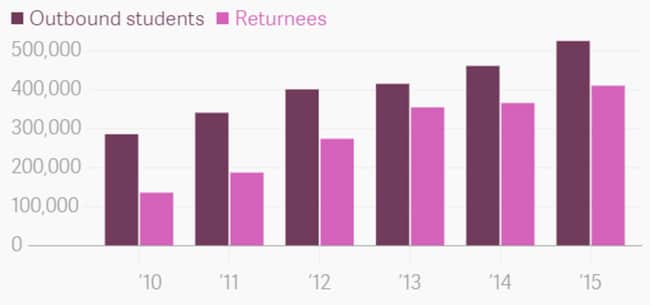A record number of Chinese students abroad in 2015 but growth is slowing
New data from the Chinese Ministry of Education reveals that both the total number of outbound students as well as the number of returnees from study abroad reached record levels in 2015. However, growth has slowed over the last two years and is notably below the average annual growth of recent decades.
A "blue book," or government report, published by the Ministry on 25 March 2016 indicates that 523,700 Chinese students headed abroad to study in 2015. This represents a 13.9% increase over 2014 levels but marks the second consecutive year - after 11.1% growth in 2014 - of growth levels below the 19.1% average annual growth over the past four decades.

A new record for returnees as well
In fact, the Ministry data also indicates that Chinese students abroad are being drawn home in greater numbers, due in part to the strong Chinese economy. A record 409,100 Chinese students returned from overseas last year, bringing the total number of returnees to 2.2 million as of 2015. Xu Peixiang, the deputy director of the Ministry’s Overseas Students’ Support Center, noted that in recent years between 70 and 80% of outbound students return to China after their studies abroad. At a press conference announcing the report, Qi Mo, head of the Ministry’s Overseas Study Department, noted that returnees are coming home in greater numbers because the domestic job market is more appealing that those overseas. The press conference to release the 25 March report. Source: Ministry of Education This may be especially true for students of Business or other non-STEM subjects in the US, for whom opportunities to stay and work are more limited than is the case for graduates of science, technology, or engineering programmes. A related survey of 25,000 new returnees, or "sea turtles" as they are popularly known indicates that the most popular study destinations remain the US, the UK, Australia, South Korea, and Japan. The US was noted as the most-popular choice for PhD studies among responding returnees, and South Korea for undergraduate studies. Nearly half of survey respondents intended to work in one of China leading cities - Beijing, Shanghai, Guangzhou and Shenzen - and nearly three in ten (29%) hoped to work in a multinational company. Roughly a third (30%) planned to work in the financial sector, 10% in education, 8% in culture, and 7% in software and IT services. Six in ten returnees tracked in the survey were women and most are between 23 and 33 years old (with an average age of 27).
















